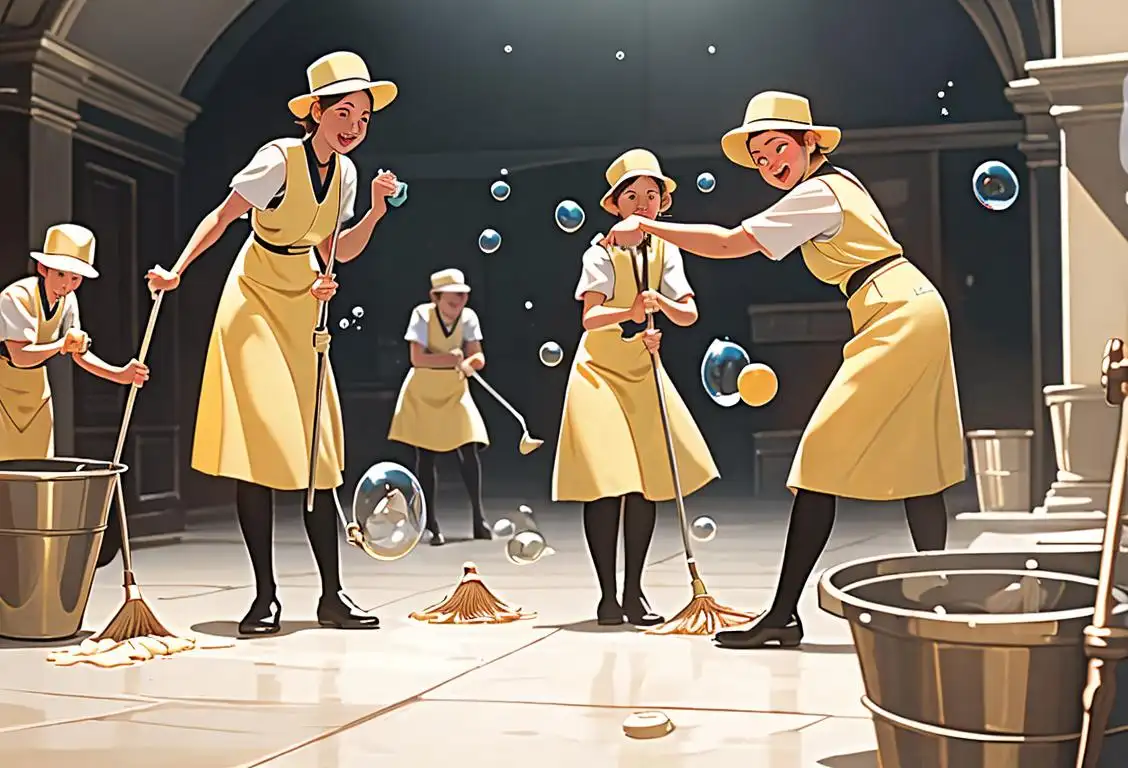National Cleaning To Fight Cholera Day

Welcome to the wonderful world of National Cleaning to Fight Cholera Day! Get ready to scrub, sanitize, and save lives as we dive into the history and significance of this important day.
When is Cleaning To Fight Cholera Day?
It's national cleaning to fight cholera day on the 23rd November.
The Origins of National Cleaning to Fight Cholera Day
Every year on November 23rd, we gather our mops, brooms, and bleach to commemorate National Cleaning to Fight Cholera Day. This day holds a special place in our hearts and bathrooms as we come together to raise awareness about the importance of cleanliness in preventing the spread of cholera.
Cholera, a highly contagious bacterial infection, has plagued communities for centuries. It causes severe diarrhea and vomiting, leading to dehydration and even death if left untreated. But fear not, my germophobic friends, as we have the power to fight back with the ultimate weapon: cleanliness!
The origins of this day can be traced back to the efforts of dedicated individuals who realized that proper sanitation practices were key to controlling cholera outbreaks. In the early days, before the wonders of modern medicine, preventive measures like regular handwashing, clean water supply, and proper waste disposal played a crucial role in reducing the spread of the disease.
How to Celebrate?
Now that you know the reason behind this squeaky-clean day, you're probably wondering how to celebrate. Here are a few suggestions:
- Scrub-a-dub-dub: Roll up your sleeves, grab a sponge, and give your home a deep cleaning. Dust those hard-to-reach corners, tackle the grime in your bathroom, and make your living space sparkle.
- Spread Awareness: Share important information about cholera prevention with your loved ones and friends. Knowledge is power, and by spreading the word, you'll help create a cleaner and healthier world.
- Join a Cleanup Campaign: Check if there are any local initiatives or events happening in your community. Get involved and make a difference by participating in cleanup drives, educating others, and promoting good hygiene practices.
Did You Know?
Did you know that the first known cholera pandemic occurred in the early 19th century? This deadly disease spread rapidly across continents, causing widespread panic and claiming countless lives. Thankfully, advancements in sanitation and medical science have helped us combat cholera more effectively.
History behind the term 'Cleaning To Fight Cholera'
1817
The Outbreak of Cholera
In 1817, a deadly outbreak of cholera spread across Bengal, India. Cholera is an infectious disease caused by the bacteria Vibrio cholerae, which is transmitted through contaminated water and food. The epidemic quickly became a global health crisis, resulting in widespread panic and a search for effective preventive measures.
1854
John Snow's Discovery
In 1854, British physician John Snow made a significant breakthrough in understanding the spread of cholera. He conducted an investigation in London's Soho district, where a severe cholera outbreak occurred. Through careful analysis of the cases, Snow discovered a correlation between the disease and contaminated water from a specific public well on Broad Street, now known as Broadwick Street. Surprisingly, contrary to the prevailing theory that miasma (bad air) was the cause of cholera, Snow proposed that contaminated water was the primary mode of transmission.
1884
Louis Pasteur's Germ Theory
French scientist Louis Pasteur's groundbreaking work in the late 19th century revolutionized our understanding of germs and infectious diseases. Pasteur developed the germ theory of disease, which stated that microorganisms (germs) cause specific diseases. This theory challenged the prevailing belief in spontaneous generation and led to advancements in medical hygiene and preventive measures against infectious diseases like cholera.
1892
James Crichton Browne's Call for Cleaning
James Crichton Browne, a British psychiatrist and neurologist, recognized the importance of cleanliness and hygiene in preventing the spread of diseases like cholera. In his influential lecture delivered in 1892, titled 'Cleanliness and Health,' Browne emphasized the role of maintaining clean living spaces, sanitation practices, and personal hygiene to combat infectious diseases. This lecture contributed to the growing understanding of the significance of cleaning in disease prevention.
20th Century
Sanitary Reforms and Public Health Measures
Throughout the 20th century, various governments and organizations focused on improving public health by implementing sanitary reforms and promoting cleanliness. This included measures like the establishment of proper sewage systems, safe drinking water supplies, and public health education campaigns. Improved sanitation and cleanliness practices played a vital role in reducing the incidence and impact of diseases like cholera.
Present Day
Cleaning to Fight Cholera
Today, 'cleaning to fight cholera' remains an essential aspect of public health strategies in areas prone to cholera outbreaks. Clean water and proper sanitation facilities are crucial to prevent the spread of cholera and other waterborne diseases. Regular cleaning and disinfection of living spaces, particularly during epidemics, contribute to maintaining a hygienic environment. The historical understanding of the role of cleanliness in combating cholera has led to ongoing efforts to ensure clean and healthy conditions for communities worldwide.
Did you know?
Did you know that the first known cholera pandemic occurred in the early 19th century?Tagged
awareness loved onesFirst identified
23rd November 2015Most mentioned on
23rd November 2015Total mentions
87Other days
Compliment Day
Cheese Pizza Day
Pumpkin Day
Medal Of Honor Day
Guac Day
Foundation Day
Suicide Prevention Day
Memorial Day
Cancer Survivors Day
Bacon Day









